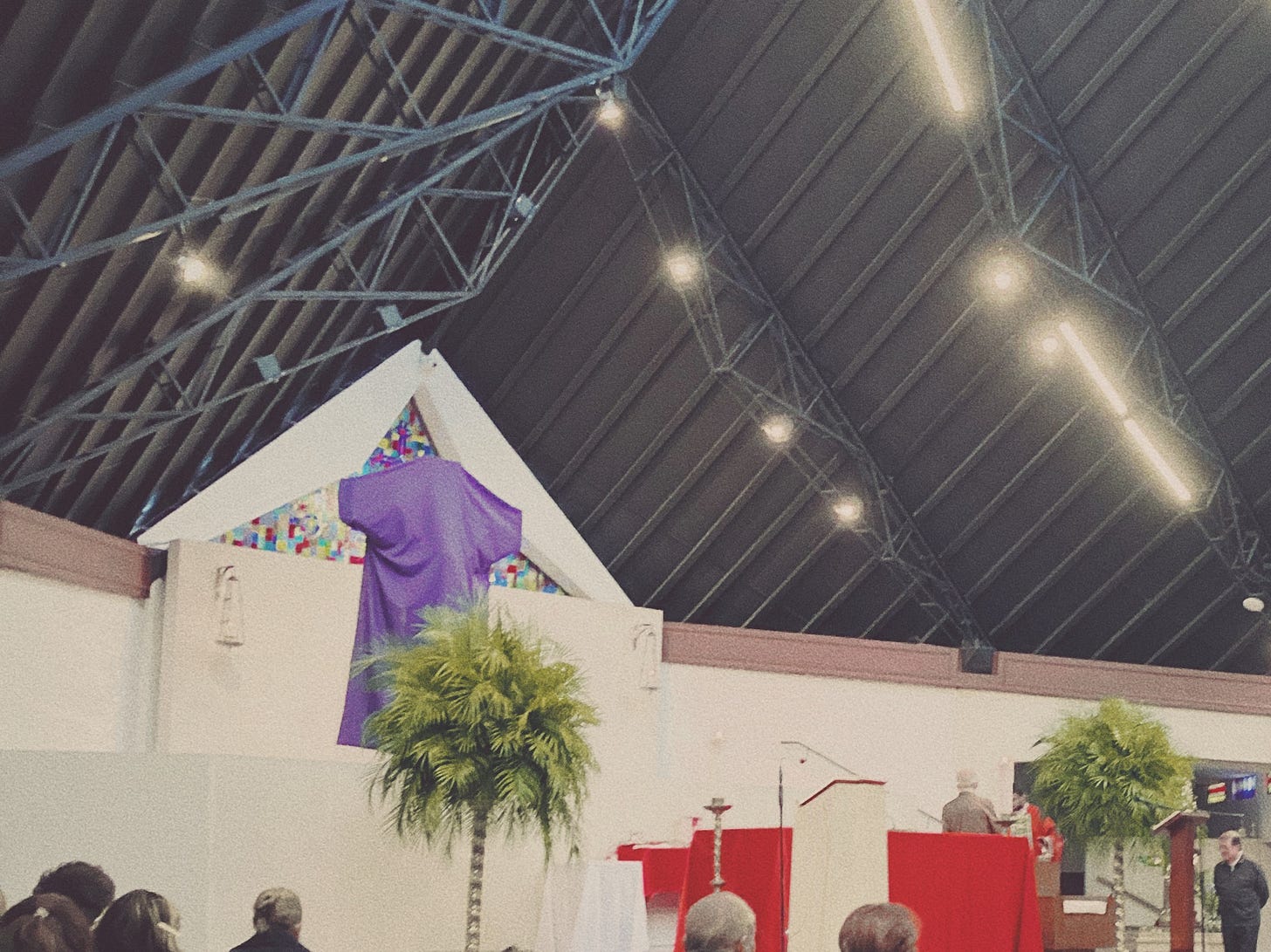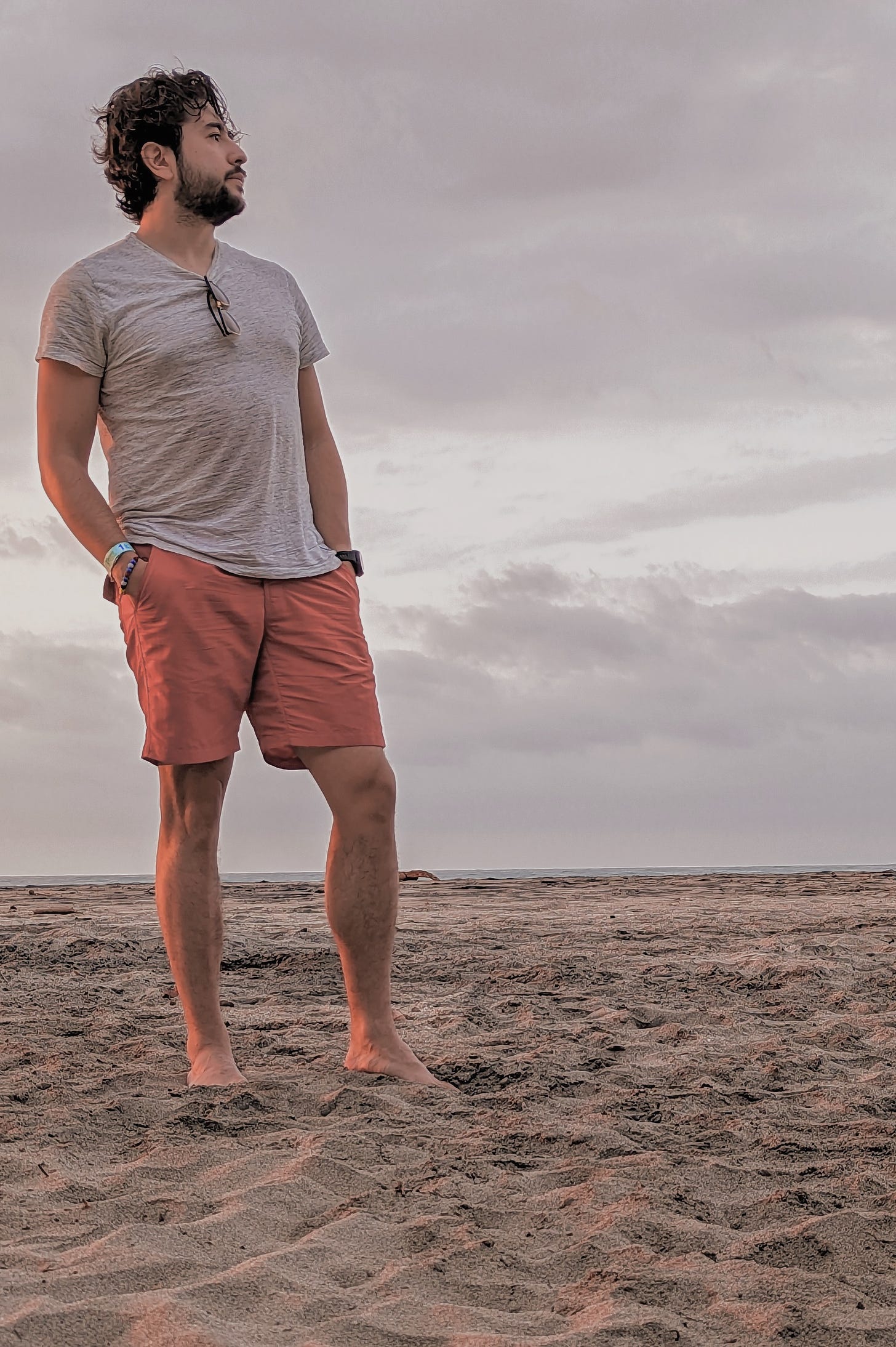Hello friends and welcome to new subscribers! 🎉. Thanks for taking this small Internet detour.
I got back from Colombia last night, heart full and with lots of writing to share.
Also, I learned my lesson last week sharing the newsletter and essay as separate posts (not a good idea). So this will be a bit longer than usual.
Take Me to Church
At first, I felt out of place.
Just an hour before I paced back and forth in my hotel room (no, really, I was pacing). Should I go or not? Would people notice it’s been a while? Would people look at me funny if I didn’t do communion?1
A large part of me was doing this for my Mom. She never asked, but I had the feeling that if I attended Palm Sunday Mass at the church we went to when I was a child in Bogotá, she would be happy (she was).
I walked in, among a crowd of families and palm branches. The church, not as cavernous as it felt from when I was a kid (everything is huge when you are 6), still felt large. Pyramid shaped ceilings, pews arranged like a C, an altar that felt close to you—not extravagant like those cathedrals we love to take pictures of.
I made my way to the back rows near the exit, in case I wanted to leave. Or the stench of not having been to a church in years for Mass would brand me a heathen and I needed an escape route.
Mass began. My muscle memory and the crowd helped me get through the first few readings and prayers. Inevitably, I became immersed in the words, the chants, the revered silence mixed with a child’s cries and a dog’s barks.
There was a psalm2, which recounted one of the last things Jesus said before crucifixion. He said: “God, why have you abandoned me?” The more this sentence was repeated, the deeper I felt it. I was overcome with emotion. It felt like I was asking God that question.
“God, why have you abandoned me?”
Yet, I had no grounds to ask God that question. I’ve never felt abandoned by God. My relationship with my Creator is—well, particular. It doesn’t accept the obligations of Catholicism, but it doesn’t dismiss the existence of God. For me God exists, and my relationship with my Creator is intimate, customized, and innate. It is not dictated or bound by ancient writings.3
Perhaps, I felt this sentence so deep because it felt like God was asking me that question.
“Camilo, why have you abandoned me?”
Through it all, I felt a deep sense of sadness and a twinge of guilt. Honestly, as I write this, I cannot tell you why I felt this way or what was the cause of the sadness—it came to me in a black box, unmarked, devoid of clues as to the why.
I did find it beautiful that I was able to feel deeply. This means I was engaged. It meant I was present, engulfed, and vulnerable to feel *all the things*.
There was another moment of deep emotion. A hymn with the chorus “Hosanna, Hosanna” reverberated through the church. It was regal, joyful, and somber (hard to explain, but the duality was there). The chorus gripped my heart. I don’t think I was as moved by the words as much as the atmosphere: Most people were singing, the sun was setting as told by the receding shadow next to the exit I was in, the cross at the altar wrapped in a purple fabric typical of Lent; the symbolism of it all. Palm Sunday represents the beginning of the end of Jesus’ life before reincarnation.
I also felt a deep nostalgia during Mass.
There was a child, probably 3 years old. He paraded through the aisles and ran towards the altar, only stopping due to the height between altar steps. It made me think of the times I went to that church as a kid. Did I behave like that? It made me wonder.
One of the powers of travel is that it can also make you time travel. If you go back to the places of your youth—see your roots—your mind will naturally want to relish in nostalgia as a way to harmonize the familiarity of the past with the present.
And I think the beauty of experiencing nostalgia is that it is an inherently introspective state. Nostalgia is feeling the past. And by feeling the past, you gain a new consciousness. You start seeing how your perception influenced what you thought of those events, those memories. Perhaps you perceive things differently now. Perhaps you will perceive things differently in the future. This reflection is healthy.
After Mass, I desperately tried to go back to my memories of coming to Mass here and tried to relive them. I thought about my Mom. I also thought about my Dad, and it is now that I’m writing this that I wonder whether he was a religious/spiritual man at all (maybe he was after our estrangement). I also thought whether I could atone for his sins so that he would be in Heaven.
Did he make it to Heaven? If not, what can I do to get him there?
Media Worth Consuming
Editor’s Note (It’s me, hi I’m the editor, it’s me):
Ok, I know I wrote about sabbaticals last week. Is this going to become a sabbatical newsletter? No. Will I bring it up from time to time? Absolutely.
Whenever, I share sabbatical or career transition related content, my intent is not to preach and tell you what to do.
What I DO want to challenge are the scripts, fears, and objections to even exploring whether a sabbatical or a career change would help you live more intentionally. One of beautiful qualities of tangents is that by veering off the convention, it invites pause and reflection.
This week I’m sharing three sabbatical and/or sabbatical-adjacent things that I’ve found interesting and insightful.
How to Design a Sabbatical by Tobi Ogunnaike: Tobi wrote this wonderful essay that mirrors some of my own thoughts (If you are new to my writing/newsletter I’ll add some essays to the footnotes4). I like how specific, without being overly prescriptive this piece is. It will be one of my reading recommendations for anyone contemplating a sabbatical.
Derek Sivers in the Pathless Path Podcast: Derek Sivers is one of the most interesting people I’ve come across. Is he a musician, writer, thinker, doer? A bit of all of those. In this podcast episode with Paul Millerd, they discuss the idea of ambition, while traveling with kids is not a bad thing, and thoughts on traveling as a path to transformation.
Confessions of a Xoogler: Reflections on The Layoff and What’s Next by Sha Hurley: Sha is a former colleague that was impacted by the Google layoffs in January. She shares a powerful reflection as to what this sudden life change triggered in her. This passage struck a chord: “ChatGPT is dominating the conversation now and people think AI is cool. But I say: wait till you dive deeper into your own consciousness. There’s no comparison.”
I can’t wait to see how her new projects unfold!
Photo of the Week
I’ve been trying to get more comfortable being in front of a camera—I’d much rather be behind. The insecurity stems from comparing myself to others. Thankfully, that’s changing a bit.
Who knows, maybe a year from now I’ll go full Zoolander mode.
Anyways, here is a beachy selfie.
Until next time!
In Catholic practice, you are not supposed to do communion if you haven’t confessed—and I never have. At this point the list would probably be too long and I don’t think priests get paid overtime.
In Catholic (and I think Christian) practice, a Psalm is a sacred poem or religious song generally from the Old Testament of the Bible. They are prayed or sung to present praises and petitions to God, to give thanks for His blessings, and to repent of sins (thanks ChatGPT!)
That is not to say that the writings of the Bible are not worthwhile, useful, or essential. But they also need to be evaluated critically, in the context of our values, and not accepted just because we have to.
Some sabbatical related essays that I’ve written:
So, you got laid off
Don’t Do Anything
Rat Race Withdrawals







I can completely relate to the feeling of going back to church after a while, having been deeply ingrained in my childhood and then completely away from it for many years.
I'm so glad it brought out those feelings and reflections my friend!
“And I think the beauty of experiencing nostalgia is that it is an inherently introspective state. Nostalgia is feeling the past. And by feeling the past, you gain a new consciousness. You start seeing how your perception influenced what you thought of those events, those memories. Perhaps you perceive things differently now. Perhaps you will perceive things differently in the future.”
Sheesh, great stuff here Camilo. Your reflections on nostalgia, the church, and God are so beautiful and so real. Thank you for writing this piece!